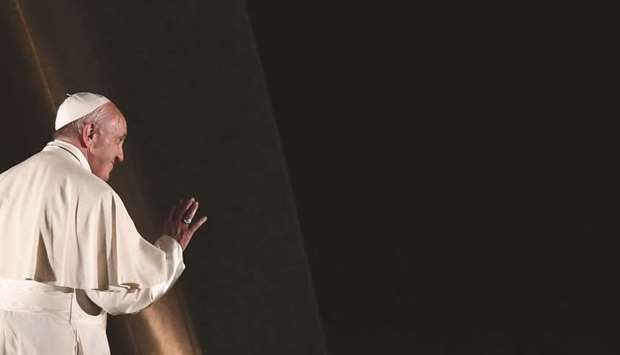Survivors of the nuclear attack on Hiroshima told Pope Francis yesterday of the “scene of hell” after the bombing, as the pontiff hit out against the use of the weapons.
The pope began his four-day trip to Japan with stops in Nagasaki and Hiroshima, where he paid tribute to those affected by the two bombs dropped by US forces in 1945 at the end of World War II.
In Hiroshima, Francis met several survivors of the attack, who echoed his calls for the world never to forget the atrocity of the bombings. Yoshiko Kajimoto was 14 years old when the bomb was dropped on Hiroshima on August 6, 1945, killing at least 140,000 people.
“When I went outside, all the surrounding buildings were destroyed. It was dark as evening and smelled like rotten fish,” she told the pope at the Peace Memorial in the city. Her eyes closed tight and her voice trembling occasionally, she described people “walking side by side like ghosts, people whose whole body was so burnt that I could not tell the difference between men and women.”
“No one in this world can imagine such a scene of hell,” she added, recalling the days of white smoke that hung above the city as the victims were cremated. Kajimoto found her father three days after the attack, but he died 18 months later from radiation exposure.
She told Francis her mother suffered illnesses from the atomic bomb for 20 years, and described her own battles with stomach cancer and leukaemia. “I work hard to bear witness that we must not use such terrible atomic bombs again, nor let anyone in the world endure such suffering,” she said. In a speech at the Hiroshima peace memorial, the pope said he was humbled by the “strength and dignity” of the survivors. “With deep conviction I wish once more to declare that the use of atomic energy for purposes of war is today, more than ever, a crime not only against the dignity of human beings, but against any possible future for our common home,” he said.
As survivors of the bomb attacks age, many fear that their message of nuclear abolition will be forgotten, and they are hopeful the pope will bring renewed attention to the movement. Testimony from another survivor Koji Hosokawa, who was unable to make the ceremony, was read out to the pope.
“I think everyone should realise that the atomic bombs were dropped, not on Hiroshima and Nagasaki, but on all humanity,” according to Hosokawa’s message.
Hosokawa was 17 when the bomb was dropped and described suffering both the physical after-effects but also the prejudice that many survivors experienced. “Although there is little time left for me, I believe that passing on the experience of Hiroshima to the next generation is the final mission assigned to us A-bomb survivors,” Hosokawa’s testimony read.

Pope Francis waves as he leaves following a ceremony at the Peace Memorial Park during his visit to the Japanese city of Hiroshima yesterday.
